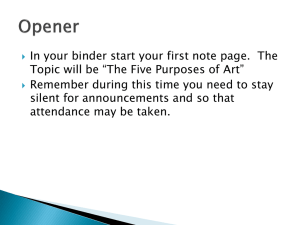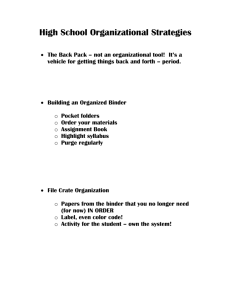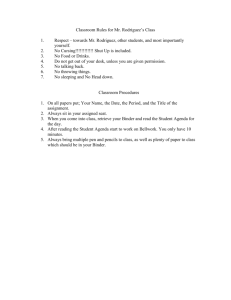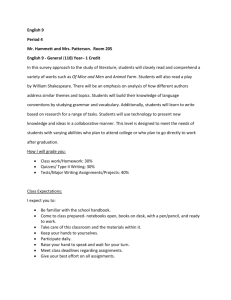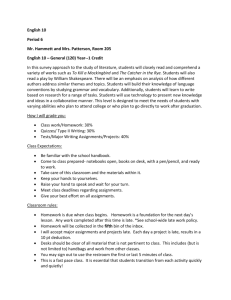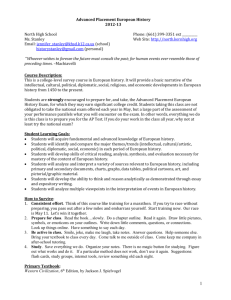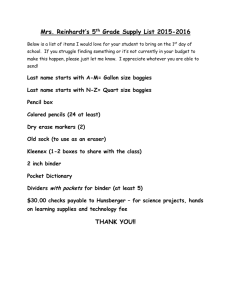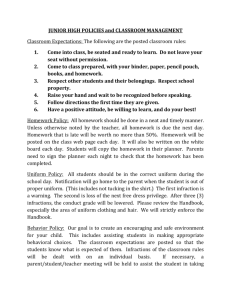AP United States History Course Materials
advertisement
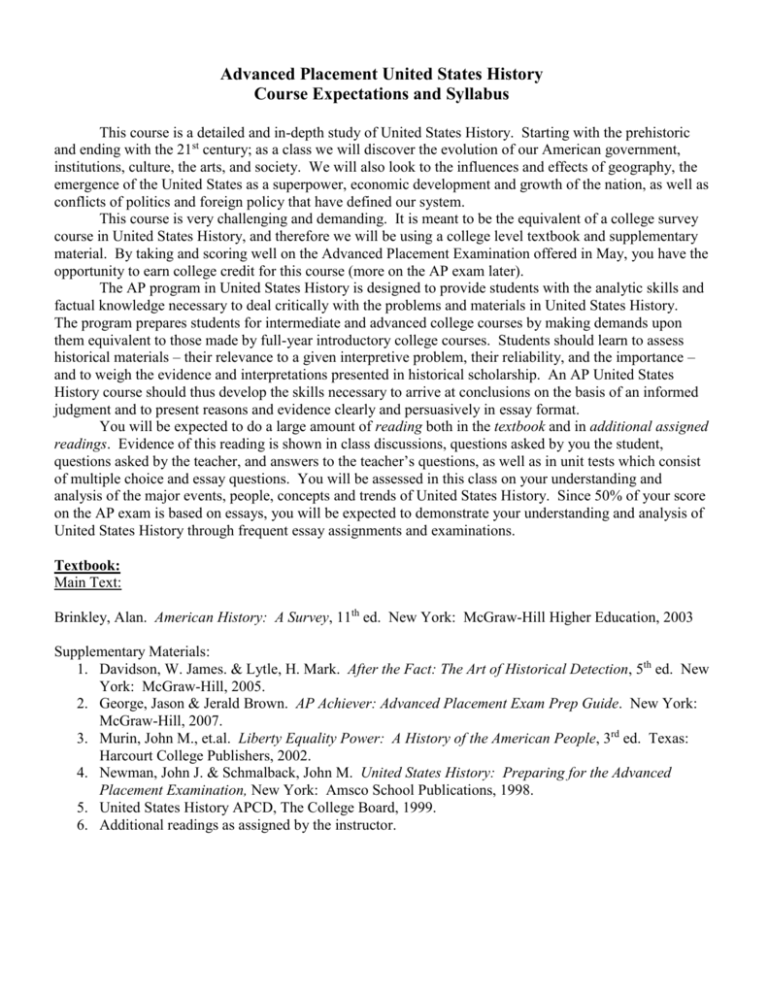
Advanced Placement United States History Course Expectations and Syllabus This course is a detailed and in-depth study of United States History. Starting with the prehistoric and ending with the 21st century; as a class we will discover the evolution of our American government, institutions, culture, the arts, and society. We will also look to the influences and effects of geography, the emergence of the United States as a superpower, economic development and growth of the nation, as well as conflicts of politics and foreign policy that have defined our system. This course is very challenging and demanding. It is meant to be the equivalent of a college survey course in United States History, and therefore we will be using a college level textbook and supplementary material. By taking and scoring well on the Advanced Placement Examination offered in May, you have the opportunity to earn college credit for this course (more on the AP exam later). The AP program in United States History is designed to provide students with the analytic skills and factual knowledge necessary to deal critically with the problems and materials in United States History. The program prepares students for intermediate and advanced college courses by making demands upon them equivalent to those made by full-year introductory college courses. Students should learn to assess historical materials – their relevance to a given interpretive problem, their reliability, and the importance – and to weigh the evidence and interpretations presented in historical scholarship. An AP United States History course should thus develop the skills necessary to arrive at conclusions on the basis of an informed judgment and to present reasons and evidence clearly and persuasively in essay format. You will be expected to do a large amount of reading both in the textbook and in additional assigned readings. Evidence of this reading is shown in class discussions, questions asked by you the student, questions asked by the teacher, and answers to the teacher’s questions, as well as in unit tests which consist of multiple choice and essay questions. You will be assessed in this class on your understanding and analysis of the major events, people, concepts and trends of United States History. Since 50% of your score on the AP exam is based on essays, you will be expected to demonstrate your understanding and analysis of United States History through frequent essay assignments and examinations. Textbook: Main Text: Brinkley, Alan. American History: A Survey, 11th ed. New York: McGraw-Hill Higher Education, 2003 Supplementary Materials: 1. Davidson, W. James. & Lytle, H. Mark. After the Fact: The Art of Historical Detection, 5th ed. New York: McGraw-Hill, 2005. 2. George, Jason & Jerald Brown. AP Achiever: Advanced Placement Exam Prep Guide. New York: McGraw-Hill, 2007. 3. Murin, John M., et.al. Liberty Equality Power: A History of the American People, 3rd ed. Texas: Harcourt College Publishers, 2002. 4. Newman, John J. & Schmalback, John M. United States History: Preparing for the Advanced Placement Examination, New York: Amsco School Publications, 1998. 5. United States History APCD, The College Board, 1999. 6. Additional readings as assigned by the instructor. Course Objectives: 1. master a broad body of historical knowledge 2. demonstrate an understanding of historical chronology 3. use historical data to support an argument of position 4. differentiate between historiographical schools of thought 5. interpret and apply data from original documents, including cartoons, graphs, letters, etc. 6. effectively use analytical skills of evaluation, cause and effect, compare and contrast 7. work effectively with others to produce products and solve problems Prepare for an successfully pass the AP U.S. History Exam Course Objectives 1. Demonstrate an understanding of the major themes; forces and trends at work in United States history. 2. Gain an appreciation for the interpretive nature of history, recognizing that there can often be conflicting views on the same situation or time period. 3. Understand how to read primary sources, discerning the author’s purpose, background, and perspective 4. Gain an appreciation of one’s own frame of reference in contrast to other views on differing time periods. 5. Understand the events of the past as a source for making sense of our contemporary lives and world. 6. Write sophisticated historical essays that develop a central idea that is supported by accurate historical information, and reaches a logical and meaningful conclusion. 7. Recognize that change is a major characteristic of history. As we view change in today’s world, we should be able to relate it to previous time periods. Expectations of students: 1. Students are to listen/take notes during lectures. Students are expected to regularly participate in class discussions/activities/assignment review, etc. 2. Students are expected to be in class, and to take the experience seriously. 3. Students will show respectful & courteous behavior toward peers and the instructor. 4. Students are expected to complete all work and reading(s) on time. 5. Late assignments will be accepted only for credit of related to a F letter grade. 6. If absent on the day of a test, the test must be made up the next day, or the first day that the student returns to school. See the teacher during the morning, preferably before school, to set up the time for the test. The test is to be made up prior to class time on that day. Missing class to make up a test is unacceptable. 7. Work must be completed in pen or be word-processed. If the teacher finds the work to be illegible, it will not be accepted, and must be redone (with late penalty). 8. Students must be on time to class. Tardiness will face consequences such as tardy detentions with the teacher before or after school, at the teacher’s discretion. Required Materials 1. At least two large three-ring binder with tab dividers for units, handouts, notes and study materials 2. Notebooks 3. Loose leaf paper 4. Agenda 5. Lots of pens 6. An open and inquisitive mind! 3 Ring Binder It is highly recommended that you maintain an AP US History binder. Extra Credit will be given for an organized binder (eight points maximum). In order to receive this credit you will have the responsibility of showing the instructor/your binder at a time l – 2 weeks prior to the end of each grading period/quarter. The three ring binder will allow you to keep track of all course materials, and will prove to be an excellent resource as you prepare for the AP Exam. You will probably need a separate binder for each semester. Your binder should be broken down into an organized scheme. Two recommendations follow: Scheme A: l. Lecture/discussion notes and class activities 2. Study guides and reading notes 3. Primary Source Readings/Articles 4. Handouts 5. Review materials Scheme B: 1. Divide according to the Units of Study Within each unit divide as follows: A. Lecture/discussion notes and class activities B. Study guides and reading notes C. Primary Source Readings/Articles D. Handouts E. Review materials 2. Other review materials Recommended Student purchase of an AP-US History review book available at book stores like Walden Books or Barnes and Noble. Take advantages of “history moments”. These include events at Heritage Hill, the Neville Museum, historical movies (be careful – Hollywood movies are for entertainment and profit – not necessarily historical accuracy), programs on the History Channel, A & E, and Biography, etc… Note Instructor may at any time make changes and modifications to any and all aspects of class instruction, material, and course requirements. Grade Distribution: Your grade will be based on the following components: 75% Tests: Tests will be made up of a combination of Multiple Choice, Essay Questions and may include matching, fill-in the blank questions. 10% Daily Work/Homework Assignments: Each semester’s Book Review, and other quarter projects as well as daily work and all other homework. 15% Participation: participation grade is made up of taking notes during lecture, discussing historical issues, working with others on projects and research etc… “Of the many things we have done to democracy in the past, The worst has been the indignity of taking it for granted.” --Max Lerner AP Grading Scale 94-100 A 86-93 A 80-85 A78-79 B+ 72-77 B 70-71 B68-69 C+ 62-67 C 60-61 C58-59 D+ 52-56 D 50-51 D49 and less F
